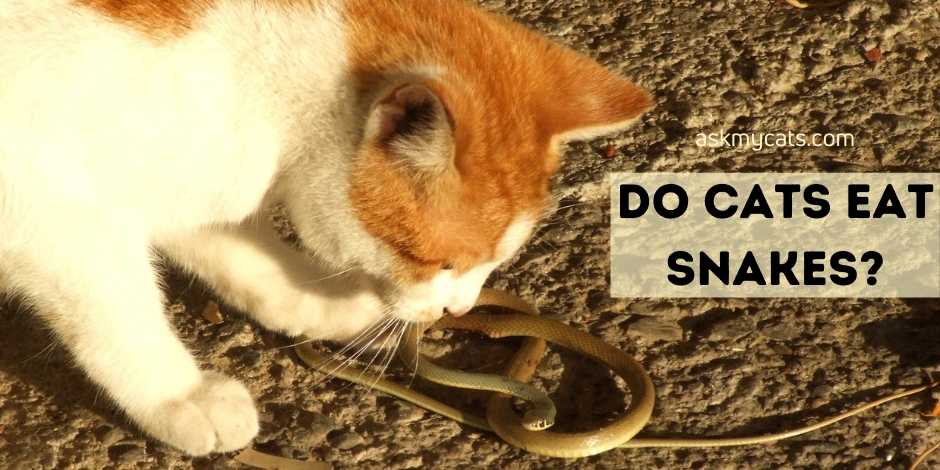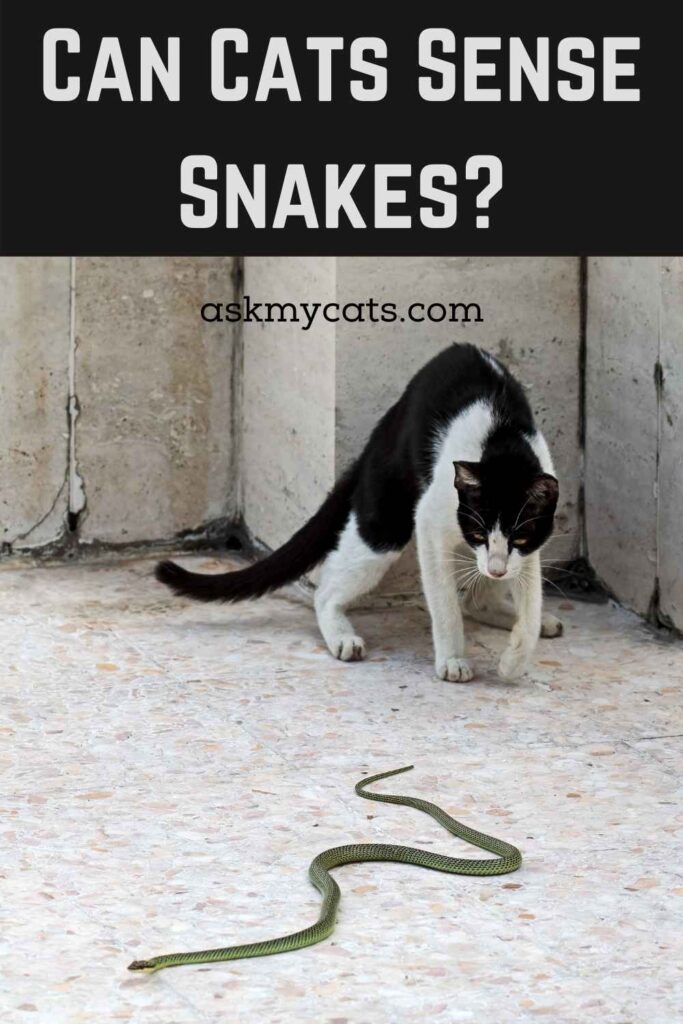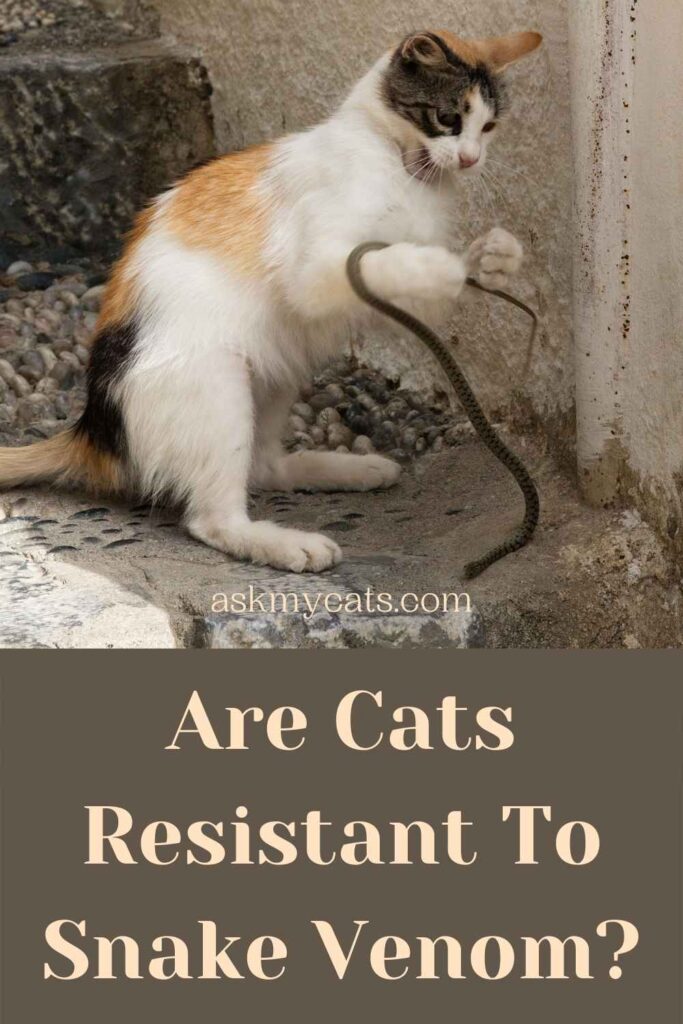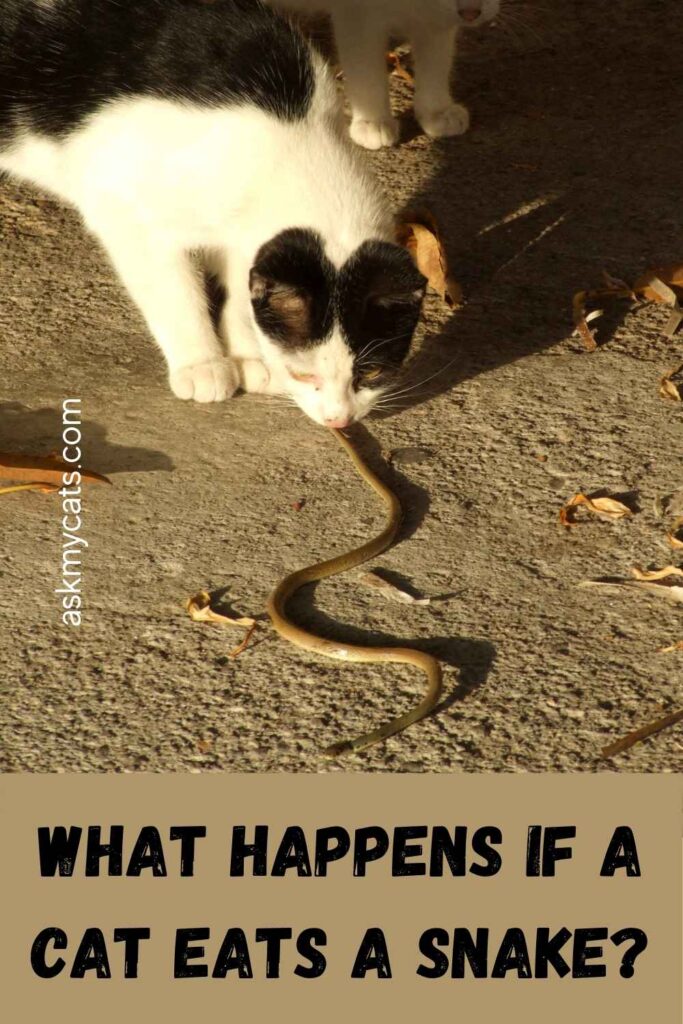While snakes have a reputation for being deadly and frightening creatures, it doesn’t mean they can’t be frightened by sneaky animals larger than themselves.
Many species can fear a snake, and it is quite likely that a snake is terrified of a cat.
Cats do eat snakes and are very resistant to the snake poison. Most cats, however, will merely fight snakes and not consume them. Cats that are bitten by poisonous snakes face considerable health risks.
Cats have distinct personalities, with some being more inquisitive or aggressive than others. The same is true for snakes.
When a snake confronts a cat in the wild, the more aggressive it is, the more likely it will turn protective.


Give Your Cat the Perfect Day
Get the Free Ebook!
Do Cats Kill Snakes?
Cats can certainly kill any species of snake. Cats, in particular, like hunting, chasing and killing slithering and wriggly critters, and snakes suit the bill wonderfully.
Cats become much more driven to go for the kill if a snake is squirming and attempting to flee.
Corn snakes, garter snakes, rat snakes, king snakes, and gopher snakes are common snakes that meet this size and length. They are mainly non-venomous snakes that live in grasslands, backyards, or shrubs.
Felines will almost certainly chase and kill snakes that are less than 6 feet long. Cats frequently stalk and circle their victim during hunting. This makes it impossible for the snake or any animal to getaway.
To evade a snake assault, the cat would usually swat and then jump back. A snake might be killed by a scratch from a cat.
They are fast, nimble, and intelligent, making them a formidable opponent for snakes. Venomous snakes are included because they can prevent the poisons from being deposited by a rapid bite.
However, a cat tangle with a snake, especially a poisonous one, is extremely dangerous.
The hook of the cat’s nail may catch a lot of dirt and pathogens. This material is then injected into a snake’s circulation, eventually killing it.
Snakes, too, eat cats, and we’re talking about larger snakes here. Tropical boa constrictors, pythons, and anacondas are the most common, capable of devouring whole lambs and antelopes.
If a cat bothers or threatens them, these slithering creatures will not hesitate to devour them, and that’s just for starters!
A cat may also kill any sort of snake just by being stressed. Reptiles are a somewhat delicate species. Stress can cause various health problems, which can ultimately to the snake’s death.
Can Cats Sense Snakes?
Cats can detect snakes even if they are not visible to the naked eye. Cats utilize their keen senses of smell and hearing to detect movement or specific odors linked with prey and/or predators. This permits them to react more quickly.

The ordinary snake will crawl about invisibly, but that isn’t quite enough for cats.
Most cats will detect and pick up on this sort of movement. This is why the cat will start looking in the direction of the sound source right away. It may be soft and undetectable to human hearing, but that does not apply to your cat.
Cats and snakes are mostly adversaries. Cats are perceived as predators by snakes, and as a result, snakes will avoid them. Snakes, on the other hand, appreciate cozy houses with plenty of food.
Finally, think about whether your cat wants to hunt them. If a snake is sighted in the garden, your cat may not be interested in chasing it down. Some cats are a little wilder, while others aren’t as much.
The way you landscape your yard has a lot to do with whether or not a snake wants to reside there. Snakes love water features, huge boulders, and lush flora, which are all popular landscaping choices. These characteristics provide a haven for snakes to conceal and lay their eggs.
A cat’s ears are capable of taking up odors that you may not be able to detect as a human.
This is due to their hunting instinct and their reliance on their nose to detect prey and/or predators. If they detect an unusual odor nearby, they will want to explore.
They want to know where everything is in their environment, which is very important when dealing with a new species like a snake.
The cat isn’t going to lay around and pretend that nothing is wrong. The cat’s head will perk up instead, and it will become hyper-aware of its surroundings.
Some will attempt to locate the snake, while others may just pay attention to certain odors or sounds that they have been aware of.
Most landscaping also provides a habitat for typical species that snakes like hunting. Small animals, such as rats, like to burrow in cool, lush areas. Birds, which are also a target animal for snakes, are another typical sighting.
Will Cats Keep Snakes Away?
Cats do chase snakes, and they may also keep snakes at bay. Snakes attract their attention because their slithering action triggers their hunting instincts.
Snakes may not be deterred by a cat’s continual presence in your yard, but if they do come, most felines will kill them or make them want to leave.
The majority of cat owners have witnessed their felines catching a mouse or another tiny, fast-moving insect or animal. Most cat toys, you may have observed, feature quick motions as well.
Cats’ hunting instincts are stimulated by quick movements because they would have a hard time capturing meals if they were not.
They attack the snake with their “death mittens,” which are their paws with claws protruding. They try to swat the snake’s head away when it hits them. Then they pounce, seizing the snake in their mouth and hauling it away to kill and play with it.
Cats like catching, killing, and eating writhing, running prey. Small snakes are ideal for this. This is especially true if the snake is terrified and writhing around furiously in an attempt to flee, which is highly likely when trapped by a predatory feline.
In this example, “little” refers to any nonvenomous snake native to the United States that is 6 feet long or less.
Snakes like king snakes, garter snakes, corn snakes, rat snakes, and even the much larger bull and gopher snakes find their way onto kitty menus. It’s quite unlikely that any of these snakes will frighten your cat in the least.
Any generalization, of course, has exceptions. Many people who have had snakes and cats as pets would tell you that their feline and reptilian companions became best friends. This is undoubtedly feasible, and many odd animal friendships have been well-documented.
However, it’s preferable not to take any chances for the sake of your cat’s safety, as well as the protection of any slippery, scaly neighbors.
The majority of snakes and all cats have the same evolutionary niche as rodents and birds: they’re natural rivals.
Snakes pique the curiosity of cats, which is generally harmful to one or both of them. Keep these animals safe by stopping them from colliding with one another.
Are Cats Resistant To Snake Venom?
Cats are twice as likely as dogs to survive a deadly snake bite, and the reasons for this peculiar phenomenon have just been discovered.

The researchers studied the impact of snake venoms on blood clotting factors in dogs and cats in the hopes of saving our four-legged pals’ lives.
Cats are curious, and there are more snakes to be interested in during the summer months. Allowing your cat outside where snakes are more abundant increases the likelihood of your cat being bitten.
Hypoxic encephalopathy, a long-term result of snake envenoming, causes permanent brain harm. Hypoxia and multiorgan failure can occur as a result of respiratory paralysis or cardiac arrest.
Many people die as a result of this, although some survive with substantial neurological disabilities.
Snakes are reptiles that are considered prey by most cats. A cat’s natural impulse is to inspect a snake and, in extreme cases, to chase, hunt, and attack it. Many snakes will attack if they feel threatened, thus this might end badly for the cat. Snakes, both venomous and nonvenomous, can bite.
A venomous snake can inject severe poisons into its victim’s body, which can be fatal. Hemotoxins (which affect the blood), neurotoxins (which impact the central nervous system), and cytotoxins (which impact the body’s cells) are examples.
Kidney failure, tissue death, an allergic reaction, and paralysis can all result from a snake bite. A venomous snake bite may not always result in the release of poisons.
Cats, unlike other animals, are more resistant to snake bites. It is still critical that you take them to the veterinarian as soon as possible.
Tell the vet what kind of snake bit you and where the bite happened if you can. This allows the veterinarian to provide the appropriate antivenin.
Don’t worry if you don’t. A multi-antivenin is available to treat a variety of snake bites.
It’s recommended to regard every snake bite as possibly poisonous unless you’re an expert on snakes and you saw the bite happen.
Bring the cat to a veterinarian clinic or an animal hospital right away so that it can receive life-saving care.
Call ahead to see whether the facility you’re going to has antivenin on hand and if they don’t seek a recommendation to someone who does.
Maintain the cat’s position by preventing movement.
Ideally, the bite region should be underneath the cat’s heart. To slow the cat’s circulation, use a pressure wrap rather than a tourniquet.
What Happens If A Cat Eats A Snake?
If a cat eats a deadly snake, there may be issues. If not, the worst that can happen is that bacteria enter your cat’s digestive tract.

Salmonella may always be found in raw meat, so keep an eye out for such signs. In any event, snakes and cats should be kept apart.
Salmonella is always a concern when eating raw meat, regardless of the animal. Apart from that, everything is up to the snake.
There will be no poisons consumed if a cat bites a dangerous snake. Certain germs, on the other hand, can enter the cat and create health issues. Take your cat to the vet right away if you suspect they’re unwell.
If your cat eats a deadly snake, it will experience many of the same symptoms as if they were bitten. Toxins are still in their bodies anyway. There’s also the possibility that the cat will consume germs.
The worst-case scenario is that your cat gets an upset stomach or an illness if the snake is neither dangerous nor venomous.
Your cat should be ok as long as the snake is little and non-poisonous. To be on the safe side, I would keep an eye on your cat after it consumes a snake. Inedible snake parts may be vomited or regurgitated by your cat.
If your cat eats a poisonous snake, though, it may become poisoned merely by eating it. Even after a venomous snake has been killed, it will still contain venom. It’s crucial to remember, however, that just because a snake is deadly doesn’t imply your cat is doomed.
Cats have double the chance of surviving a deadly snake than their canine counterparts, according to research.
If cats are given anti-venom medication, they have a better chance of surviving.
If you feel your cat has been bitten by a snake, you should take him or her to your veterinarian, regardless of whether or not you feel the snake is toxic.
The veterinarian will be able to tell you if your cat’s health is in danger as a result of the snake bite.
Poison can take a long time to pass through your cat’s bloodstream, so you may not notice straight immediately.
Are Snakes Afraid Of Cats?
Snakes are terrified of cats, which many people find strange.
Cats are most people’s cuddly companions, but snakes are considered the adversary. From a snake’s point of view, this is completely wrong.
If you currently have a cat and want to add a snake to your collection of pets, you may do it securely.
In this case, keeping your cat and snake separated in separate rooms is the best approach to keep your cat safe. If this isn’t possible, at the absolute least, you should keep your snake in a snake-specific cage or tank.
Snakes, on the other hand, will continue to defend their territory. By hissing, hitting, and, in some cases, rattling, they demonstrate that they are on the defense. All of this serves as a warning to the cat to keep away from them.
In any event, snakes will try to stay away from cats. Unless the cat is interested, the snake will most likely be avoided by the cat.
Frequently Asked Questions
What kinds of cats eat snakes?
Snakes may be caught by house cats, and they may do it quickly. Cats are incredibly nimble and quick. I’ve read that they have the greatest kill rate of any cat species on the planet, surpassing lions, tigers, jaguars, cheetahs, and anything else.
What animal keeps snakes away?
Snakes are preyed upon by foxes and raccoons. Snakes will be kept at bay by guinea fowl, turkeys, pigs, and cats. If foxes are native to your region, fox urine can be used as a natural snake deterrent when distributed around your home.
How can a cat kill a snake?
Snakes are attacked by cats by hitting them with their paws and murder weapons, sharp claws. When a snake retaliates by striking in its direction, a cat will bat its head and then pounce on it, grabbing the snake by the head with its mouth, biting and twisting the snake’s neck until it breaks, paralyzing the snake.
Final Words
Snakes are eaten by cats. They like chasing squirming objects.
As a result, if they encounter a snake, they will follow it and consume it. Cats and snakes are always in contact.
Cats can make a snake nervous, while larger snakes may terrify a cat.
Cats, as natural hunters, have a keen awareness of snakes. They have heightened senses that allow them to detect movement even in the dark.
Snakes may be found practically anywhere, which is why cats frequently encounter them.
If you have any questions, feel free to clear your doubts in the comments section below!
